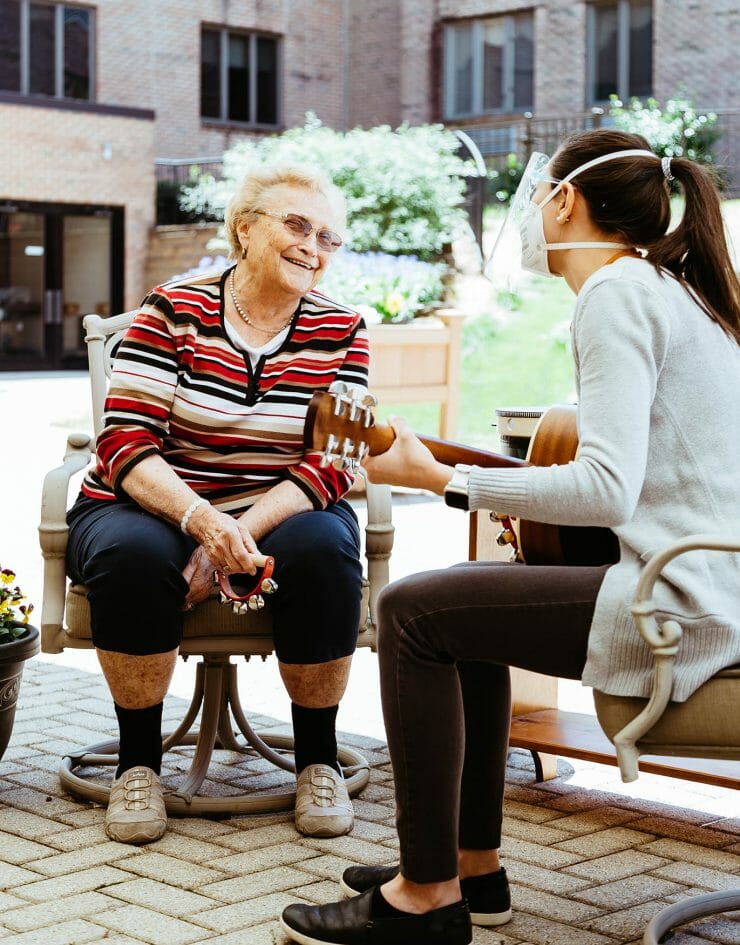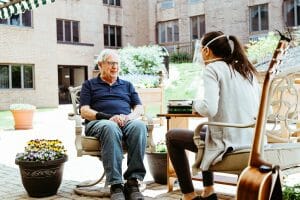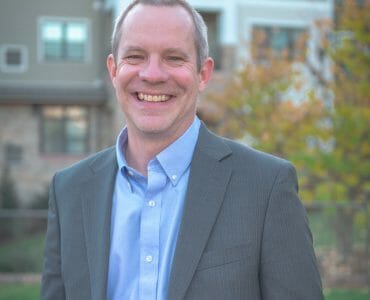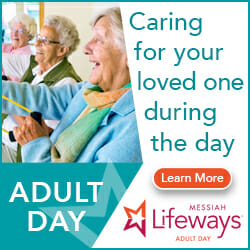As you enter the Adult Day program at Messiah Lifeways, you may be greeted with the sweet sounds of music. Music Therapy sessions are provided several times per week to attendees both individually and in small groups. Adult Day attendees have the opportunity to participate in music therapy interventions to work on a range of non-musical goals including increasing cognitive awareness and attention as well as decreasing agitated and anxious behaviors. Upon first glance, you may think this looks fun and enjoyable but what you aren’t seeing is the science behind the ‘why’-the reason music therapy interventions are used and provide opportunities for success. So why and how does music therapy work?
What is Music Therapy?
The American Music Therapy Association (AMTA) states “Music therapy is the clinical and evidence-based use of music interventions to accomplish individualized goals within a therapeutic relationship by a credentialed professional who has completed an approved music therapy program.” After completing coursework at an approved college or university, a 1200 clinical-hour internship must be completed to earn a music therapy degree. Music therapists must then pass a board certification exam to earn their MT-BC (music therapist-board certified) credential. To maintain this, they must continue to adhere to the American Music Therapy Association’s professional code of ethics and standards of practice and complete 100 continuing education credits every 5 years.
Customized for Each Client!
After assessing the strengths and needs of each client, qualified music therapists develop a treatment plan with goals and objectives and then provide the indicated treatment. Music therapists structure the use of both instrumental and vocal music strategies to improve functioning or facilitate changes that enhance quality of life. They may improvise or compose music with clients, accompany and conduct group music experiences, provide instrument instruction, direct music and movement activities, or structure music listening opportunities.
Music is a whole-brain experience. When we listen to, move to, and create music, our brains are activated in many different areas. This is because music is not stored in a localized spot on our brains, but rather is spread around, integrated into the core of our human system. You may have witnessed someone who suffered a stroke not be able to verbalize a four-word sentence, however, they can tunefully sing “You are my Sunshine”. This is because when words are paired with music, the active parts of the brain are engaged to activate a response and can bypass the area affected by the stroke. Therefore, as the brain deteriorates through the process of aging and dementia, music has the power to impact the active parts of the brain, creating opportunities for a person that may otherwise be out-of-reach.
When a board-certified music therapist observes, assesses, and then designs music interventions to meet the functional abilities, needs, and preferences of a person, positive responses can often be immediate and readily apparent. This positive response occurs in those with and without a musical background.
The following list shows a sample of the opportunities one may experience by participating in music therapy:
- Memory recall which contributes to reminiscence and satisfaction with life
- Positive changes in mood and emotional states
- Sense of control over life through successful experiences
- Awareness of self and environment which accompanies increased attention to music
- Anxiety and stress reduction for older adult and caregiver
- Nonpharmacological management of pain and discomfort
- Stimulation which provokes interest even when no other approach is effective
- Structure which promotes rhythmic and continuous movement or vocal fluency as an adjunct to rehabilitation services
- Emotional intimacy when spouses and families share creative music experiences
- Social interaction with caregivers and families
Through various music therapy interventions research indicates an increase in immunoglobulin, a decrease in cortisol, and a release of endorphins which in turn can improve mood while also decreasing pain and agitation. Music therapists are trained to adapt the intervention to the variety of feelings and responses that may arise in sessions. Adaptations may look like introducing music, changing the music, or removing music. Music is a form of sensory stimulation, which provokes responses due to the familiarity, predictability, and feelings of security associated with it. Although there is no cure for Alzheimer’s disease or dementia, music therapy is an effective form of treatment.
Every person resonates with different styles of music and songs depending on their preferences. Generally speaking, music is not one size fits all. Music and songs from the time period of a person’s formative years, military involvement, love and marriage, career, and major life experiences, are of great importance. When music is used with intention by a board certified music therapist, the musical experience coupled with the relationship between participants frequently evokes unique and, often, overwhelmingly positive responses.
During a music therapy session, the music therapist provides a variety of interventions to the individual and/or group. Interventions are often presented in a call and response format to allow for predictability, imitation, and initiation. Instrument playing may be used to allow for self-expression, interaction, direction following, and social interaction. Movement to music is often incorporated to encourage physical endurance, increase range of motion, and self-awareness skills. Song writing can be used to provide an outlet for self-expression, memory recall and improving self-confidence. Lyric analysis is a powerful intervention which uses specific songs as a catalyst for discussion and exploration of sensitive topics that may otherwise be difficult to discuss or process. Music-assisted relaxation is provided to decrease anxiety and provide a sense of comfort and calm. Therapeutic singing is presented to help with clarity of speech, speech pragmatics and oral communication skills.
Observed outcomes of these musical interventions include:
- Reduced muscle tension
- Improved self-image/Increased self-esteem
- Decreased anxiety/agitation
- Increased verbalization
- Enhanced interpersonal relationships
- Improved group cohesiveness
- Increased motivation
- Successful and safe emotional release
Messiah Lifeways Adult Day is located on the campus of Messiah Lifeways at Messiah Village. If you are interested in taking a tour or learning more about this program for a friend or loved one give us a call at 717.967.8069 or visit our webpage.








